Content
- Symptoms of acute and chronic hepatitis B
- When to start therapy
- Life-threatening liver disease
- Compensated cirrhosis
- Liver pathology without pronounced fibrosis
- Other factors to consider when choosing a treatment regimen
- Treatment of hepatitis B with drugs
- Amiksin
- Zeffix
- Ingaron
- Neovir
- Remaxol
- Tiloram
- Ademetionine
- Binnoferon alpha
- Interal -P
- Intron A
- Liv 52
- PegIntron
- Reaferon EU
- Phosphazide
- Entecavir-SZ
- When can treatment be discontinued?
- Video about drugs for the treatment of hepatitis B
Hepatitis B treatment carried out after a detailed examination and confirmation of the diagnosis. The drugs are selected individually, depending on the patient's age and the degree of liver damage. Medicines must be taken strictly according to the instructions, it is strictly forbidden to arbitrarily increase or decrease the dose.
Symptoms of acute and chronic hepatitis B
Treatment of hepatitis B (drugs should be selected on an individual basis) is carried out by medication.
Symptoms of the disease can vary depending on the degree of damage to the biliary organ and the period of the course of hepatitis:
| Period | Symptoms |
| Incubation | Lack of appetite, headache, bouts of nausea, fatigue, drowsiness. |
| Pre-jaundiced | Temperature jumps, pain in muscles and joints, body aches, increased gas production, flatulence, bitter belching, heartburn, bouts of nausea. |
| Icteric | Swelling, increased heart rate, surges in blood pressure, sleep disturbances and fatigue, enlarged liver, discoloration of feces, yellowing of the sclera and skin, itching. |
| Chronic | Muscle pain, enlarged liver, yellowing of the skin and sclera, pain in the right side. |
| Cirrhotic | Gastric, intestinal bleeding, blanching of the skin, a decrease in the biliary organ, disturbances in the psycho-emotional background. |
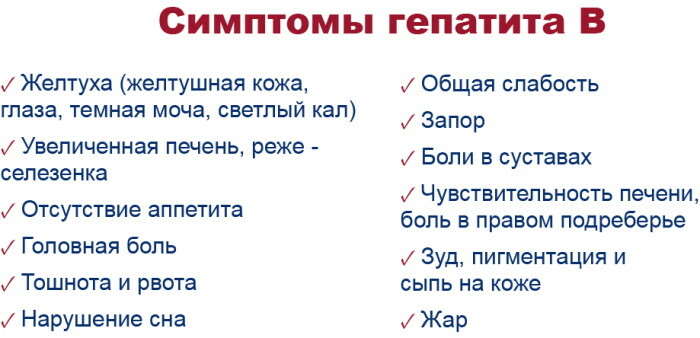 Acute hepatitis develops suddenly. Pathology is characterized by the development of asthenic (yellowness of the sclera and skin, discoloration of feces and urine) and dyspeptic (heartburn, vomiting, nausea) disorders.
Acute hepatitis develops suddenly. Pathology is characterized by the development of asthenic (yellowness of the sclera and skin, discoloration of feces and urine) and dyspeptic (heartburn, vomiting, nausea) disorders.
When to start therapy
Liver pathologies require drug treatment. The decision on the appointment of a particular drug should be made by a specialist. Almost all medicines have contraindications, which the doctor identifies during the examination.
Life-threatening liver disease
Treatment of hepatitis B (drugs have contraindications, so they cannot be taken without the agreement of a doctor) at home requires compliance with medical prescriptions. Usually, liver transplantation is indicated for the patient with life-threatening pathologies. In the period of preparation for surgical intervention, the patient needs to take medications aimed at supporting the functional activity of the biliary organ.
Compensated cirrhosis
Pathology is accompanied by the rapid destruction of liver cells and the formation of regenerative nodes. Patients with cirrhosis are shown a special diet. Drug therapy is selected individually.
It may include the following drugs:
- vitamin complexes;
- preparations of ademetionine (Heptral, Heptor) and selimarin (Legalon, Selibinin);
- glucocorticosteroids (methylprednisolone, prednisolone);
- ursodeoxycholic acid preparations (Urdoksa, Ursofalk, Ursosan).
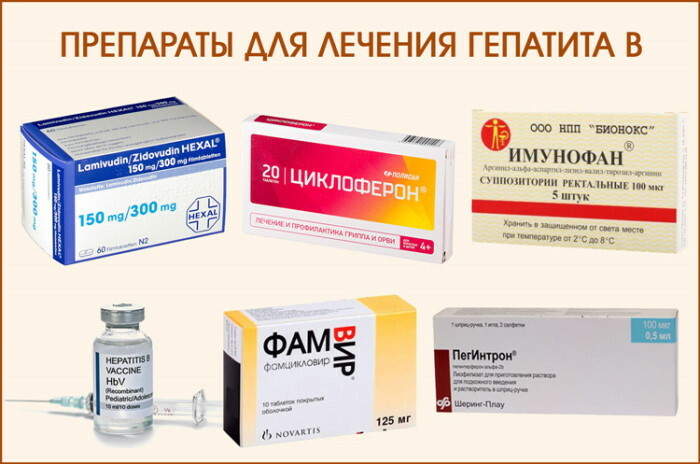
Hepatitis B treatment: drugs
Treatment can take several months (6-18).
Liver pathology without pronounced fibrosis
Treatment of hepatitis B (drugs included in drug therapy have a restorative effect) does not always involve surgery.
For liver diseases not characterized by fibrosis, the following drugs may be prescribed:
- L-nucleosides (Telbivudine, Lamivudine;
- Non-cyclic nucleoside-phosphonates (Adefovir, Tenofovir);
- Deoxyguanosine and its analogs (Entecavir).
Most of the above drugs are characterized by antiviral activity.
Other factors to consider when choosing a treatment regimen
There are several ways to treat hepatitis B. The drugs are selected depending on the degree of organ damage.
When drawing up a treatment plan, the doctor takes into account the following factors:
- the gender of the patient (young women planning a pregnancy in the future are prescribed more gentle drugs);
- genetic predisposition (if the patient has relatives suffering from liver pathologies, then a geneticist may need to be consulted);
- age (children, adolescents and elderly patients may need to adjust the dosage regimen).
During the treatment period, patients should be under the supervision of a physician.
Treatment of hepatitis B with drugs
Drug therapy for acute and chronic hepatitis B is prescribed after the patient has passed laboratory tests (blood for bilirubin and aminotransferase, urine). Also, the Sr7 patient should undergo a diagnostic examination (ultrasound, ultrasound, CT, MRI).
Treatment of hepatitis B, drugs for which the doctor selects, often involves taking such drugs:
- Amiksin;
- Zeffix;
- Ingaron;
- Neovir;
- Remaxol;
- Tiloram;
- Ademetionine;
- Binnoferon Alpha;
- Interal-P;
- Intron-A;
- Leukinferon;
- Liv-52;
- PegIntron
- Realdiron
- Reaferon EU
- Tameron
- Phosphazide
- Entecavir-SZ.
Most of the medicines prescribed for hepatitis B require a prescription from a pharmacy.
Amiksin
The drug is marketed in tablet form. The active ingredient is tilaxin (tilorone). The medication has a pronounced immunomodulatory and antiviral effect. The main components belong to the category of interferon inducers of a synthetic nature. In the body, the substance promotes the production of interferons.
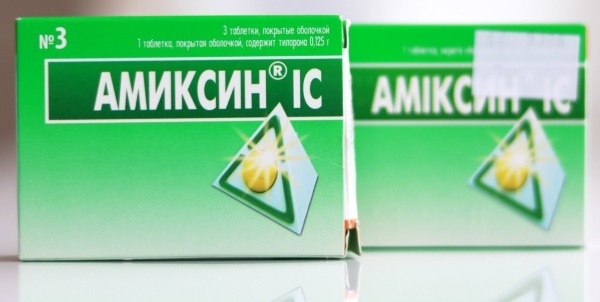
The latter, in turn, take part in the synthesis of granulocytes, neutrophils and hepatocytes (liver cells). The drug form dissolves completely in the intestine. In the blood, the maximum concentration is found after 6-18 hours. after the first dose. The bioavailability is average, it binds to blood proteins by 85%.
The drug is contraindicated in children, pregnant and breastfeeding women, hypersensitive patients.
The tablets are taken whole, without dissolving in water or chewing. For hepatitis B, especially in the acute form, patients should drink 1 tablet every 24 hours. (2 days). Then the medicine is drunk on the 4th, 6th, 8th day (etc.). For acute hepatitis, the patient must take a total of 16 tablets. With pathologies of a chronic course, the course of application varies within 3-6 months.
Zeffix
The drug form is tablets, the main component is lamivudine. The medication has a persistent antiviral effect. The main substance can be considered a nucleoside analogue. The drug can be included in drug therapy for chronic and acute hepatitis B. When it enters the body, lamivudine is metabolized to triphosphate, which can penetrate the viral DNA. The drug is not characterized by toxic effects.
The tablets dissolve in the intestines. The concentration (max.) In the blood is detected after 60-90 minutes. Average bioavailability, no more than 83%. The main component is found in the cerebrospinal fluid.
The presence of food in the stomach does not in any way affect the rate of absorption of the tablets. The daily intake of the drug for adults is no more than 100 mg, which is equivalent to 1 tablet. The course of application is selected individually.
Ingaron
The active ingredient in the lyophilisate is interferon gamma. The substance is capable of exerting antiviral and immunomodulatory effects. The main component contains 144 amino acids.
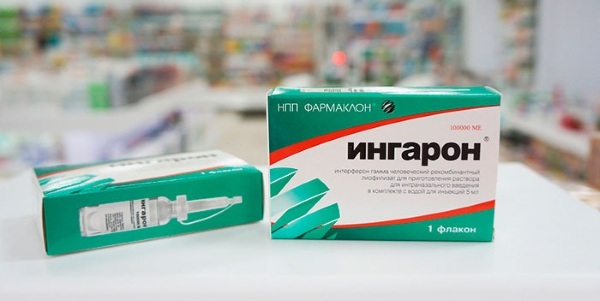
The substance is obtained in a laboratory way through biosynthesis. Gamma interferon is a cytokine that also has an anti-inflammatory effect. The killer cells are responsible for the synthesis of the substance. Interferon gamma speeds up the production of proteins. It is also responsible for blocking RNA and DNA replication.
The lyophilisate is diluted with water for injection. The solution can be administered subcutaneously or intramuscularly. The dosage regimen, as well as the course of administration, should be selected individually. Usually, patients with hepatitis B are injected no more than 5000 IU per day. Injections are made once every 2 days. The course of treatment is 60-90 days. If necessary, it can be repeated after 60 days.
Neovir
The medication is marketed in the form of tablets and solution. The main component is kridanimod. Auxiliary elements may vary depending on the formulation. Cridanimod has antiviral and immunomodulatory effects. The substance is responsible for the destruction of the RNA and DNA of viruses. Also, the drug is characterized by a slight anti-chlamydial effect.
With regular use of the drug, the balance of suppressor cells, T-lymphocytes and interferons is restored. Cridanimod also stimulates the synthesis of killer cells. Bioavailability is high (over 90%).
Neovir solution requires intramuscular administration. Dosage - no more than 5 mg / kg. Injections are given several times a day (interval - 2-3 days). Therapeutic dose of tablets - no more than 1500 mg (750 mg once). The tablets are drunk 1 to 2 days. The duration of treatment is 7-14 days.
Remaxol
The composition of the solution for injection contains succinic acid, nicotinamide, methionine, methylglucosamine and riboxin. These substances act as active ingredients. They have cytoprotective, antihypoxic, antioxidant and hepatoprotective effects. The drug can be included in the complex drug therapy for hepatitis B and cirrhosis.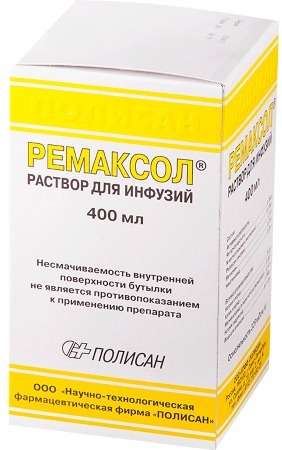
The active components initiate the synthesis of macroergs. Succinic acid is metabolized to provide nutrients to the liver cells (hepatocytes).
With systematic use, a restoration of the level of bilirubin is observed. Remaxol requires intravenous drip. The daily rate is no more than 800 ml. The course of treatment is 4-14 days. The rate of administration of the solution is 50-60 drops per minute.
Tiloram
The drug contains tilorone in the form of dihydrochloride, which acts as an active ingredient. The drug comes on sale in the form of tablets. The main substance belongs to the category of inducers that promote the formation of interferons. Also, tilorone has an immunostimulating and antiviral effect.
The producers are neutrophils, T-lymphocytes, hepatocytes and granulocytes. The formulation is completely absorbed in the intestine. The maximum concentration in the blood is detected after 6-18 hours. The drug helps to accelerate the formation of killer cells.
The tablets are taken whole, without chewing or dissolving in water.
Patients with hepatitis B (especially in acute form) should drink:
- 125 mg for the first 48 hours. (interval - 24 hours);
- 125 mg every 2 days (interval 48 hours).
The course of treatment is 10-11 days.
Ademetionine
The active substance is the component of the same name, which belongs to the category of coenzymes. He participates in the processes of transporting groups of organic compounds. The drug comes on sale in the form of a lyophilisate and tablets. Ademetionine has antidepressant, antioxidant, neuroprotective, hepatoprotective and detoxifying effects. The substance is responsible for restoring the balance of coenzymes, stimulating their production by the liver and brain.
The drug is characterized by a mild anticholestatic effect. With regular use, the rate of bile outflow is restored. In hepatitis B, the drug is administered intramuscularly or intravenously, after dissolving the lyophilisate in a solution of Lysine. The daily dose is not more than 800 mg. Intravenous administration should be carried out in a stream and slowly. The therapeutic dose of the tablets is 1600 mg. The course of application varies within 45-60 days.
Binnoferon alpha
The drug form is a solution for subcutaneous and intravenous administration. The main component is recombinant human alpha-interferon. The protein, readily soluble in water, belongs to the group of cytokines.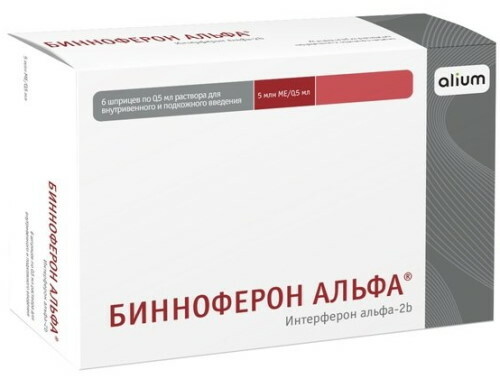
The drug has antiviral, antiproliferative, immunostimulating effect. Interferon alpha is capable of inhibiting DNA and RNA replication. With hepatitis B, patients are injected 34,000,000 -35,000,000 IU in 7 days (no more than 5,000,000 per day). The course of application is 16 weeks.
Interal -P
The composition of the drug contains alpha-interferon, which acts as an active ingredient. The medication has an immunomodulatory, antiviral and antitumor effect. The drug goes on sale in the form of a lyophilisate. Highly purified, readily soluble protein is metabolized in the liver.
In acute hepatitis, the medication is administered intramuscularly. The daily dose is not more than 2,000,000 IU. It is advisable to divide it into 2 applications. In chronic hepatitis, the drug is injected intramuscularly 2 times a week (1,000,000 IU once). The course of application varies within 10-14 days.
Intron A
Intron is a drug that can be included in drug therapy for hepatitis B. The composition contains human recombinant alpha interferon. The substance has an immunostimulating, antiviral and antitumor effect. Interferon is able to bind to specific receptors, provoking the formation of reactions responsible for the suppression of viruses.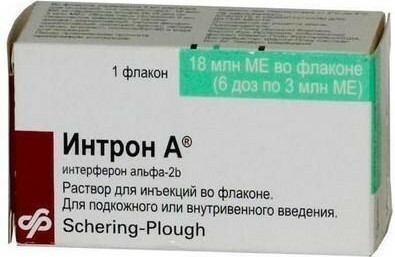
On tumor xenografts, alpha-interferon has an antiproliferative effect. The solution is administered subcutaneously. The daily dose is 5,000,000 IU once every 2 days. In severe cases, injections can be given daily.
Liv 52
The preparation contains substances of natural origin.
Extracts of the following medicinal plants act as active ingredients:
- common yarrow;
- western cassia;
- Gali tamarix;
- arjuna terminalia;
- black nightshade;
- common chicory;
- prickly caper.
The drug has a pronounced hepatoprotective effect. Under the influence of active components, the protein-synthetic function of the biliary organ is restored. The drug also has a protective effect, protecting the liver from the negative effects of medicines, alcoholic beverages, spicy, fatty, low-quality food.
Adult patients need to take 2-3 tablets (up to 3 times a day). The drug form is not dissolved in water and is not chewed, swallowed whole. It is advisable to drink pills in 25 minutes. before meals.
PegIntron
The active ingredient in the preparation is alpha peginterferon. The substance belongs to the category of immunomodulators and cytokines, conjugates of monometax and polyethylene glycol. The drug goes on sale in the form of a lyophilisate. Recombinant interferon is obtained from leukocytes. 
When it enters the body, the substance penetrates the DNA of the virus and triggers a series of reactions that lead to cell death. The drug is usually included in the drug therapy for chronic hepatitis B.
The lyophilisate is diluted with water for injection and administered to the patient subcutaneously (no more than 1.5 μg per 1 kg once). Injections are given once a week. The course of use of the drug is 24-50 weeks. The doctor selects the dose individually, depending on the age of the patient and the presence of diseases associated with hepatitis.
Reaferon EU
Reaferon, like most drugs prescribed for viral hepatitis B, contains alpha-interferon in its composition. It goes on sale in the form of a lyophilisate. Recombinant human interferon has immunomodulatory, antitumor and antiviral effects. When a virus enters the cell, interferon triggers reactions that slow down the synthesis of protein kinase and cytokines.
Usually Reaferon is prescribed for severe and moderate forms of acute viral hepatitis (jaundice period). The solution is administered topically, subconjunctivally, subcutaneously or intramuscularly. Dilute sodium lyophilisate with chloride or water for injection. The liquid should be transparent and colorless, free of foreign particles and sediment.
In acute forms of hepatitis, Reaferon is administered subcutaneously or intramuscularly (no more than 1,000,000 IU once) twice a day. The course of application is 5-6 days. If necessary, you can extend the course for another 5 days.
Phosphazide
Phosphazide in its composition contains a substance of the same name, which acts as an active ingredient. The concentration can vary (200-400 mg). The drug is marketed in the form of tablets, coated with a rapidly dissolving intestinal membrane.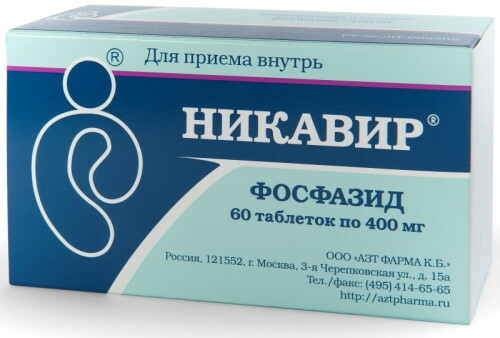
Phosphazide is classified as a transcriptase inhibitor. It is a modified synthetic analogue of thymidine. The drug is characterized by antiviral anti-inflammatory (mild) effect. The tablets dissolve quickly in the intestine. The drug is characterized by high bioavailability. The active ingredient is able to overcome the blood-brain barrier.
The drug is prescribed for acute hepatitis of moderate and mild forms. The course of administration and dosage regimen are selected individually. Usually, patients take 1-2 tablets of Phosphazide per day (no more than 400 mg per day). The course of treatment is 2-3 weeks.
Entecavir-SZ
Entecavir is marketed in the form of enteric-coated tablets. The composition contains a component of the same name, which acts as an actor. Auxiliary elements may vary depending on the manufacturer and the dosage of the active substance. Entecavir belongs to the category of synthetic guanosine (nucleoside) analogs. The substance has an antiviral effect. Once inside the cell, the component damages the DNA, which leads to the destruction of the virus.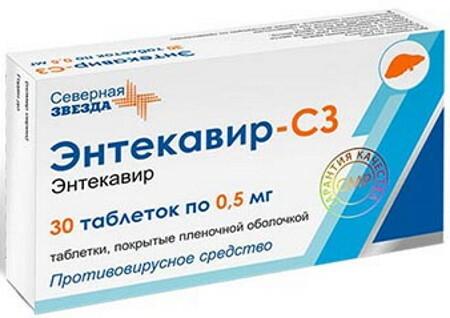
The product is characterized by fast adsorption. The tablet dissolves completely in the gastrointestinal tract in 45 minutes. Unlike other drugs, it is recommended to take Entecavir on an empty stomach no later than 2 hours in advance. after the last meal. The daily dose of the drug for patients with viral hepatitis is 500 mcg. The course of application is 14-21 days.
When can treatment be discontinued?
Patients with acute viral hepatitis require long-term therapy. After taking medications, the body must be given time to recover. In acute hepatitis, drugs are taken in courses for 36-60 months. An interval of 2-4 weeks must be observed between each.
Lifelong therapy is indicated for people suffering from cirrhosis and chronic viral hepatitis. If you suddenly stop taking medications, then there is a high risk of developing exacerbations, leading to death. Patients should be constantly monitored by doctors. Cancellation of therapy is possible only after the disappearance of HBsAg (virus antigens).
Treatment of hepatitis B is a rather lengthy process. Patients are forced to take several drugs at the same time. It will be easier to achieve a positive result if you follow a special diet. Patients are strictly forbidden to consume alcoholic beverages, spicy, fatty and salty foods.
Video about drugs for the treatment of hepatitis B
An overview of medications for the treatment of hepatitis B:



